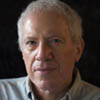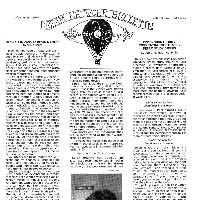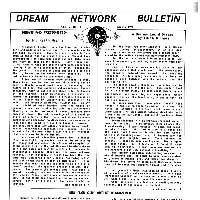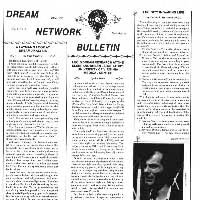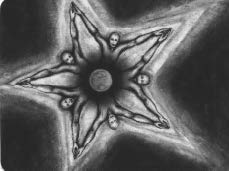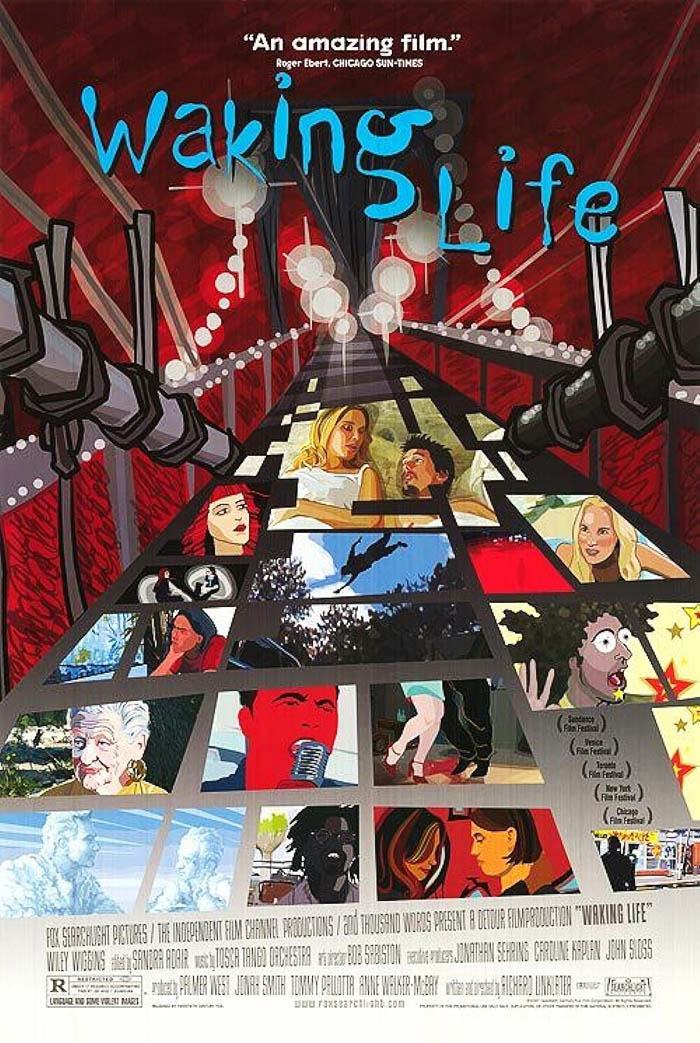"The psychological rule says that when an inner situation is not made conscious, it happens outside, as fate. That is to say, when the individual remains undivided and does not become conscious of his inner opposite, the world must perforce act out the conflict and be torn into opposing halves". C.G. Jung
I am writing this article a day after another suicide bomber blew herself up in Israel. I can't help but notice the similarity to the events of September 11. To view these events symbolically, as if they are a dream, reveals a very profoundly deeper process at work. Whenever there is a recurring pattern such as this in a dream, be it a waking or sleeping dream, it should draw our attention.
Jung felt that what he called "Active Imagination", in which you actually dialogue with your fellow dream characters, was the most powerful form of dreamwork that he had ever encountered. In genuine active imagination, he points out, you will oftentimes be surprised at how your dream characters respond to you, as their response is not written by your ego. I find myself wondering, what if I was to do active imagination with the greatest psychologist of the twentieth century, Jung himself? What would he tell us, psychologically speaking, about our current apocalyptic situation, I wonder?
Upon imagining this, I immediately sense the presence of Jung, almost like he's relieved that he's been finally invited somewhere to share his realizations. He seems as if he's in the possession of a priceless gift, and he seems delighted at the opportunity to share it with someone who seems interested and open. Rather than ghostly, his presence seems quite substantial, actually quite huge, and very warm. When I ask him what he wants to share with me, he becomes a bit professorial, and starts stressing the importance of viewing our current world situation symbolically, as if it actually were a dream, and interpreting it as such. When I share with him that this is exactly what I teach people to do in my work, he seems quite pleased.
Jung reminds me that, psychologically speaking, apocalyptic dreams like these are symbolically expressing the emergence of what he calls the Self, or God-image. He points out, I imagine, that the Self is what is called an antinomy, an unconscious conjunction of opposites, containing both light and dark.
I immediately associate to the Christ event, in which God incarnated through one man 2000 years ago. When read symbolically, God's dark and light sides were totally split, completely polarized in the full-embodied figures of Christ and Satan. I imagine Jung pointing out quite excitedly, that, yes, this is showing us that there is a relationship between the incarnation of God and the opposites being totally polarized, that this situation is not merely coincidence. I remember that it was Jung himself who taught me, a Jew who was a practicing Buddhist, how to view the Christ event symbolically in the first place.
I immediately reflect on how the opposites are totally polarized in our current world situation. The Israelis and Palestinians want to kill each other. As do the Americans and the terrorists. How could this possibly have to do with the incarnation of God, I wonder? I immediately associate. I ask myself if maybe there's a deeper meaning to why our culture's myth of the incarnation of God 2000 years ago was an abuse drama. I mean, is there a difference between God, who is one with everything and all, putting nails through his own body 2000 years ago during the crucifixion, and propelling jet planes through skyscrapers on September 11? I share this with Jung, in my imagination, of course, and he seems happily surprised by my question.
I then imagine Jung passionately trying to make the point of how important it is for more of us to realize what the events in our current world situation are symbolically revealing to us. He reminds me of his quote "There are, and always have been, those who cannot help but see that the world and its experiences are in the nature of a symbol, and that it really reflects something that lies hidden in the subject himself".
As if teaching, he then explains that when an archetype such as the Self is incarnating, it is a very powerful energy that literally drafts people into its force-field, gripping them (he puts an emphasis on the word "gripping"), making them its unwitting agents and victims, like puppets on a string. I immediately remember what he writes in his greatest work, Answer to Job "The image of God pervades the whole human sphere and makes mankind its involuntary exponent".
If we are not in conscious relationship to what is happening, Jung continues, we literally become possessed by the archetype and act it out unconsciously, in a destructive way. Jung stresses the point that this is, in actual fact, what is getting played out in our current world situation, as if he really wants me to fully understand this. I imagine showing him the quote of his with which I started this article, and he says, "that is exactly right!"
Jung reminds me of the letter he wrote after he finished Answer to Job, in which he says "I have landed the great whale". His tone becomes more intimate, as he shares with me that he had made a huge discovery in this work that is profoundly relevant to our current world situation, and is still, to this day, little understood. I imagine Jung very enthusiastically (which he reminds me, comes from the word en-theos: to be filled with God), wanting to show me a particular quote from Answer to Job. The quote is
"Although (God) is already born in the pleroma (the eternal fullness), his birth in time can only be accomplished when it is perceived, recognized and declared by man".
I find myself becoming ecstatic as I take in his words and contemplate their meaning. He is pointing out that when we view our situation AS IF it's a dream, it both literally, as well as symbolically, reveals to us that God is already born in the collective unconscious of humankind. Not only this, but the act of recognizing this is the very act which accomplishes God's "birth in time", making it real.
I immediately associate to the saying of Christ "The kingdom is spread all over earth and people just don't see it". I then remember the teachings of Dzogchen, the highest teachings in Buddhism, which continually points out that we merely have to recognize the nature of our situation. This all seems to be pointing towards a deeper patterning inherent in our situation that we need to recognize, to see. This is what the deeper dreaming process is symbolically showing us and somehow, our seeing what is getting played out through us, is the very act that radically changes our entire situation. I was beginning to glimpse why Jung was so passionate
I remember the word apocalypse actually means that something is being revealed. Jung is saying that what is getting dreamed up on the real time stage of life in events such as September 11 and the current situation in Israel are themselves the unmediated, fully-embodied expression of the psychic reality that God is incarnating through, in and as this world of ours, and needs to be "perceived, recognized and declared" as such.
Jung seems quite delighted to be sharing something that is meaningful and precious to him personally with someone who really appreciates it. It makes me happy that he feels this way, as I myself feel appreciated, and not only honored at what he's transmitting to me, but practically blessed.
I imagine him, then, very animatedly sharing with me his realization that the Self was not just incarnating through one man, like it did 2000 years ago through Christ, but was incarnating itself through all of humanity. I hear Jung reminding me of his quote from Answer to Job, the "Christification of many", which he repeats over and over, as if he is enjoying the sound of the words. When he realized all this, he continues, as his mood immediately becomes more somber, "It was then that I ceased to belong to myself alone, ceased to have the right to do so. From then on, my life belonged to the generality".
I realized that Jung was sharing with me his epochal, radical and evolutionary realization that humankind itself played a participatory and crucial role in the Divine incarnation process. It was as if his entire dialogue depended on me understanding that if we don't realize what is symbolically being shown to us, we will undoubtedly destroy ourselves, as the activated archetype will continue to get acted out by us unconsciously, as it has throughout human history.
He then shows me what he wrote in a letter about what he expressed in Answer to Job, "I have come to the conclusion that I had better risk my skin and do my worst or best to shake the unconsciousness of my contemporaries rather than allow my laxity to let things drift towards the impending world catastrophe". As he considers these words, he seems genuinely sad, and when I ask him about this, he expresses how frustrating it is for him that so few understand what he wrote about in Answer to Job. When he shares this with me, I immediately think he is a true hero, and I start to feel a sense of appreciating his genuine courage, his true greatness, and I feel an upsurge of emotion. I immediately am filled with gratitude for what he has brought forth.
Snapping out of his melancholy with a suddenness that is startling, Jung then says, as if receiving a revelation, that if we are able to realize that we have all gotten drafted into and are playing roles in a "divine drama", and "perceive, recognize and declare" what is in fact actually happening, that the Self is incarnating through all of humanity, then we incarnate this realization consciously, as individuation, both individually and collectively.
Now totally inspired, with a twinkle in his eye, Jung continues, saying that when we recognize that the archetype of the Self is incarnating, we are then able to consciously and creatively humanize and mediate these powerful archetypal energies in the service of individuation, which is nothing other than the incarnation of the Self in, as, and through humanity. I imagine Jung beaming, as he triumphantly declares, yes, humanity becomes the vehicle, the vessel, the medium through which the paradoxical God reconciles, resolves and reunites the opposites intrinsic to the totality of his and her nature, which includes both light and dark. He then quotes himself, saying "Man is no more an end in himself, but becomes an instrument of God, and this is really so".
I realize, to my astonishment, that Jung is articulating a whole new myth of who we are, as well as our place in the cosmos, and it is one that gives humanity incredible freedom and a great responsibility. I have the thought that I am in the presence of a living genius. I then remember that the word genius is related to the word "genie" (as in "I dream of"), which is related to the word daemon, which means the inner voice, the guiding spirit. Is Jung just a personification of my own guiding spirit, I find myself wondering? I feel Jung bemused by my contemplations, as he starts smiling, and then breaks out in a big laugh. I see why so many people have said he has an unforgettable laugh.
I spontaneously remember a dream I had years ago, where a dream character pushed me off an edge, and as I flew through the air, I became lucid, realized I was dreaming, and had a deep spiritual experience. Contemplating the dream later, I found it curious when I realized that I never would have jumped off that edge myself, so amazingly, I dreamed up the dreamfield to push me off. I wonder if that's similar to the nature of our current world situation? I practically feel in telepathic connection with Jung, by this point. He seems to be quite satisfied with our discussion.
I imagine Jung urging me to end this article with a beautiful quote of his. "But, in the end, the hero, the leader, the saviour, is one who discovers a new way to greater certainty. Everything could be left undisturbed did not the new way demand to be discovered, and did it not visit humanity with all the plagues of Egypt until it finally is discovered". I imagine him making sure I understand that the current apocalyptic events in our world are a modern day plague of Egypt. As he reminds me of this, his image starts to fade, just like a rainbow dissolving into the voidness of its own nature. I hear him over and over saying "It all depends on if humanity realizes what is symbolically being revealed". I feel like I am receiving a mystic revelation.
It is like the entire episode has been a dream. I feel deeply moved by my imaginary dialogue with Jung, in a way that is quite real. Even in my dreams that night, I feel genuinely affected by my encounter with Jung. I wake up the next morning feeling strangely refreshed.
An innovator in the field of dreaming, Paul Levy is in private practice, helping other people who are also spiritually awakening to the dream-like nature of reality. A pioneer in the field of spiritual emergence, he is in the new book, Saints and Madmen: Psychiatry Opens Its Doors to Religion. Passionately interested in the work of C. G. Jung, he was the Book Service Manager of the C.G. Jung Foundation of New York in the late 1980s.

